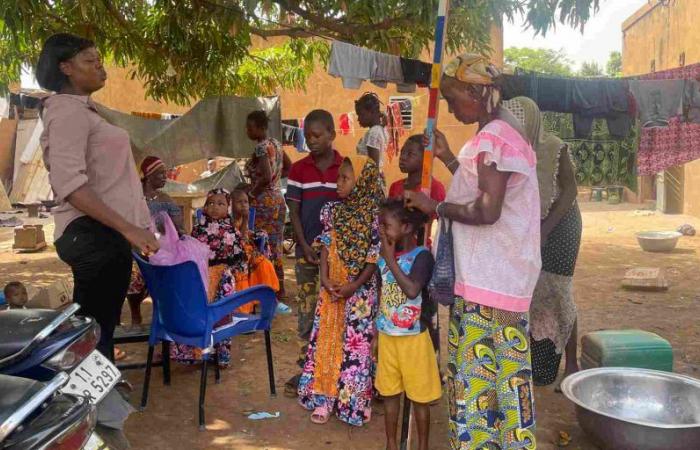At the Kossodo Medical Center with Surgical Antenna (CMA), in the Nongr-Massom health district, Céline Tiendrébéogo, a community health worker (ASBC), and her partner Azara Tiendrébéogo, are preparing to distribute medications against bilharzia and identify zero-dose children. Their mission begins at 7 a.m. on Monday, May 20. They travel through precarious neighborhoods, where many children do not have access to health care and escape routine vaccination campaigns.
Schistosomiasis, also known as bilharzia, is a parasitic disease that affects more than 250 million people worldwide, primarily in tropical and subtropical regions where access to safe water, sanitation, and health care is often limited. Bilharzia is caused by parasites of the genus Schistosomawhich are transmitted to humans through contact with contaminated fresh water.
In Burkina Faso, the prevalence of the disease varies between 4% and 75% depending on the health districts. This disease causes a high morbidity burden, particularly affecting children in vulnerable communities.
They stop at the Zongo family. Habibou Zongo agrees that the product, praziquantel, be administered to his three grandchildren. Depending on their size, they each received between one and three tablets to take on site.
The mass treatment campaign against schistosomiasis has demonstrated the effectiveness of a combined approach to protect children’s health. By tackling both a parasitic disease and the issue of vaccination, Burkinabe health authorities hope to break the cycle of disease and offer a better future to the most vulnerable children.
They meet Aicha Kaboré and her two children, internally displaced persons, who have been living in this precarious neighborhood for more than two years. “My children, aged 2 and 5, have never received any doses of vaccines, let alone treatment for bilharzia,” she says. This is why she described the ASBC team’s visit as “beneficial,” because her children were able to benefit from adequate health care and will soon catch up on their vaccinations. They were referred to the CMA to receive the first doses of vaccines in their lives.
The effectiveness of a combined approach
“We must combat schistosomiasis within our communities, especially among zero-dose children,” said Dr Bertrand Somé, the Chief Medical Officer of the Nongr-Massom health district northeast of the capital.
Indeed, zero-dose children, those who have never received any vaccines, often come from the same vulnerable communities where schistosomiasis is endemic. These children are not only exposed to the risks of vaccine-preventable diseases, but also to parasitic infections such as schistosomiasis, which increases their health vulnerability.
The mass treatment campaign against schistosomiasis has demonstrated the effectiveness of a combined approach to protect children’s health. By tackling both a parasitic disease and the issue of vaccination, Burkinabe health authorities hope to break the cycle of disease and offer a better future to the most vulnerable children.
Credit: Abdel Aziz Nabaloum
The head of the Expanded Programme on Immunization (EPI) in the Nongr-Massom health district, Fissi Congo, says that many zero-dose children have been found during treatment campaigns against parasitic diseases in precarious areas. He adds: “The non-vaccination of a child always catches up with him. He is vulnerable to diseases. However, vaccines allow children who have received them to develop a form of immunity against several diseases. So, in addition to fighting bilharzia, we are also fighting infectious diseases.”
The team of community health workers continues its journey through the streets of Kossodo. In the Ilboudo family, Salim (2 years old) and Hamado (5 years old) have never been vaccinated since birth. “They don’t even have a vaccination record. So, we are going to refer them to the health center to correct this anomaly. In addition to treating bilharzia, our mission is also to identify zero-dose children to immunize them against different diseases,” says Céline Tiendrébéogo.
“Our teams go out with the medicines and vaccines, go door-to-door, go to schools, markets, places of worship… to administer them to our targets. When we meet zero-dose children, we refer them to the health center to update their vaccination schedule,” says Azara Tiendrébéogo.
The mother of the two young children rejoices: “I will not hesitate to go to the health center so that my children finally receive their first drop of vaccine to strengthen their health. The health worker sensitized me and I realized that by vaccinating them, they will avoid many diseases,” she confides.
A necessary convergence of struggles
While the results of the campaign are encouraging, much remains to be done to achieve the goal of eliminating schistosomiasis and vaccinating all children.
Coming from Titao following the terrorists’ atrocities, the Sangaré family first took refuge in Ouahigouya before settling in the outskirts of Ouagadougou, in a dilapidated home. “I don’t have the means to go to a health center, so my two children are regularly sick. The health workers told me about the benefits of vaccination. From now on, I will quickly go and have my children vaccinated, who have never received any vaccines since birth,” confesses Maimouna Sangaré, their mother.
Credit: Abdel Aziz Nabaloum
Rabiatou Sawadogo, 4, has never been vaccinated against any disease. As a zero-dose child, she was identified by the medical team. Her mother is also happy to know that she will be able to benefit from vaccines from the Expanded Program on Immunization (EPI). “I didn’t know that vaccines were free. Plus, I’m poor. That’s what prevented me from vaccinating my children. From now on, all my children will be vaccinated,” she says.
The mass treatment campaign against schistosomiasis was an opportunity to reduce the number of unvaccinated children, according to Estash Yemkoudougou, from the health promotion department at the Kossodo CMA. She is convinced that the fight against bilharzia can be carried out while tackling the problem of unvaccinated children. “Parents must understand the importance of vaccines for the future of their children. If we manage to eliminate the phenomenon of unvaccinated children, their vulnerability to diseases will decrease. To achieve this, we must identify and vaccinate all unvaccinated children,” she adds.
Follow the author on Twitter: @AbdelNabaloum






